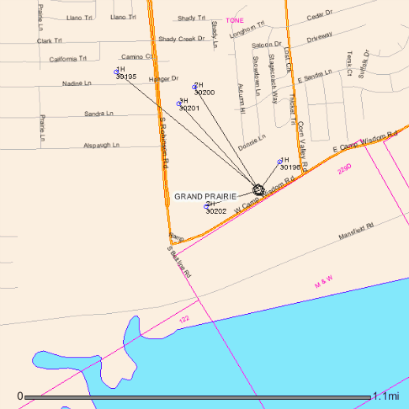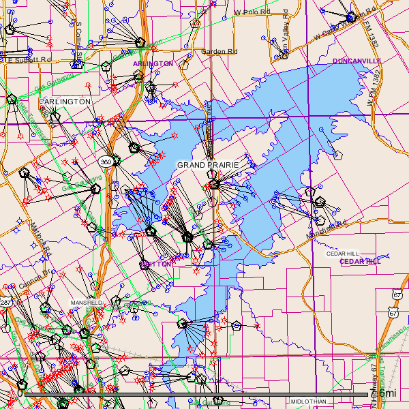
3900 Robinson Road
Grand Prairie, TX 75052

 http://www.philly.com/philly/opinion/inquirer/20101222_All_city_cyclist_wants_for_Christmas__A_ticket.html
http://www.philly.com/philly/opinion/inquirer/20101222_All_city_cyclist_wants_for_Christmas__A_ticket.html
The holidays can be a dangerous time out there on the internet. Protect yourself by educating yourself and beware of what seems to good to be true, because it probably is. Especially if you heard about it on the internet!
The holiday shopping season is a great time to get tech products at discounted prices, but it also creates a golden opportunity for the Web's scam artists. The FBI, McAfee, the Better Business Bureau and F-Secure are all warning about cybercriminals who will try to take you for a ride this holiday season. Here are their most pertinent warnings and tips for staying safe:
The Infamous Free iPad
Bogus free iPad offers started popping up immediately after Apple's tablet went on sale, and they've since been banned from Facebook. Still, you might see similar offers around the Web, McAfee says, prompting you to buy other products as a condition of getting the free iPad. By now, you should realize it's too good to be true.
Gift Card Scams
That free $1,000 gift card offer you saw on Facebook? Bogus, of course. McAfee says that cybercrooks lure people into giving away their personal information or taking quizzes in exchange for these cards, which never arrive. The information is then sold to marketers or used for identity theft.
The FBI also says to use caution when purchasing gift cards through auction sites or classified ads. These can be fraudulent, and you won't get your money back. Buy directly from retailers instead.
Bogus Auctions and Classifieds
Here's a particularly tricky scheme pointed out by the FBI: On auction and classified sites, fraudsters use their own order forms to get payment details from holiday gift buyers. Then, they charge the victim's credit card and use a stolen credit card to buy the actual item, which is sent directly to the victim. In other words, you'll still get the product, but you might be liable for receiving stolen goods. To avoid this scam, be sure to use legitimate payment services like Paypal instead of providing money directly to the seller.
The feds also warn of a related scam for free or reduced-price shipping offered on auction and classified sites. The fraudsters provide fake shipping labels to the victim, and the product ends up being intercepted in transit, never delivered to its destination.
Malicious websites
For cybercriminals, spamming Google with bogus holiday gift pages is a yearly tradition. These pages could be loaded with malware or payment forms intended to steal your identity. F-Secure has created a list of what it thinks will be the highly targeted search terms this year, including Kinect for Xbox, Call of Duty: Black Ops, Amazon Kindle and Apple iPad. Visit retailers' websites directly when possible, use Internet security software if you must and always check for "https" in the URL bar before ordering online to ensure that the page is secure.
Wi-Fi Hackers
Public Wi-Fi networks will get a workout this holiday season as people travel, McAfee notes. This is especially true with Google offering free Wi-Fi on domestic flights from three major airlines. Check out our security tips from Google's free Wi-Fi offer at airports last year, most of which are still relevant in the skies. Number one tip: Avoid shopping and paying bills over a public network.
The read the full article from PC World click here.
 the know” who has information about a major virus on the horizon. These messages can almost always be ignored. The email message you received from the “reliable source” asking you to forward it on is the “virus” itself. We will talk about these messages in more detail during next week’s IT classes.
the know” who has information about a major virus on the horizon. These messages can almost always be ignored. The email message you received from the “reliable source” asking you to forward it on is the “virus” itself. We will talk about these messages in more detail during next week’s IT classes. 
 |
| Goodbye Space program |
 |
| Let's Talk Tech |
| (From the Science Channel) |


Staying safe online is always a challenge and with the holidays the virtual Grinch's surround us along with the cheer. Lets face it, everyone likes receiving greetings cards and the hackers know this. That is why it is critical for all of us to protect not not only ourselves, but our network as well. The problem is that it can be difficult to spot these potential assaults because they come in so many forms and it seems as though new ones are being created daily. E-cards received in your email, like the popular “postcard from Hallmark virus” is one such scam that is circulating the internet these days, and here is what you need to know about it.
This particular hoax is merely an email that is being sent that warns the recipient of the worst email virus ever. It tells you that if you receive an email telling you that you have a postcard from Hallmark that this email is carrying the worst virus ever and that this was confirmed by Snopes.com. The virus is supposed to burn your entire hard drive. While it is important to remember that emails can carry viruses and that you should always be careful, this particular email is a hoax. This email itself is a problem in the sense that it causes human hysteria, although your computer is actually safe!
Quite simply never open e-cards, no matter the time of the year. E-cards have a terrible history of exploiting users who open them, resulting in viruses, trojan horses and worms.
Our in-house computer security training on December 21, 2010 will address this issue in more detail.
This holiday season the hot gadget is the Samsung Galaxy Tablet. At 7” x 4” as compared to the Apple I-Pad’s larger frame of 9” x 7” the Galaxy is a much more mobile device then the I-Pad, weighing in at about half of the I-Pad. This article is not meant to actually compare the two devices so that is all you are going to hear about the Apple I-Pad. (I actually can’t help myself a little later in the article.)
Samsung’s Galaxy tablet runs on Android 2.2 software which is becoming one of the most popular mobile device OS’s (operating system) today. The big four carriers (ATT, Verizon, Sprint and T-Mobile) all have different plans for the Galaxy so you need to be aware of this if you are thinking about it. Personally I believe the most fair plan is Verizon Wireless for 20 bucks a month. With this plan you get 1GB of traffic over their network, but the best part is that you are not locked into a contract and you can cancel the plan at any time. After the plan is cancelled with Verizon Wireless, you simply treat the tablet like a laptop, using it’s wireless connectivity to access any wi-fi network.
The device is sturdy and because it is about the size of a trade paperback it is as mobile as a book making it very easy to travel with. If I carried a purse (which I don’t) you could easily store it there as well! 
Now on to the fun stuff. What can you do with it once you have one? Android software was initially developed by Android Inc. and eventually purchased by Google in 2005. Android has been slowly developing and becoming more popular with mobile devices and has truly become a big player in the market. The operating system is dependable and easy to learn, although there are those who claim that it is a too “techy”. Android software is “community-based firmware” which means that it is open source allowing for programmers to easily develop software for any device running Android. What this means is there are always plenty of useful and fun apps (or applications) for the device.
In addition to surfing the web with various browsers of choice (Android Browser, Firefox and Dolphin, with Chrome on the way) you can get your social networking on with Facebook, Twitter, Linked-In, Goodreads and more. Watching video from services such as Youtube is flawless as well.
If you are a book reader (like me) and you have been thinking about e-book readers like the Amazon Kindle or Barnes & Noble Nook, look no further that this device. The Galaxy has great apps for both which work great. I actually have had a Nook for about a year, and after a day or two with the Galaxy Tablet I was able to retire it (giving it to one of my sons of course) and use the galaxy for this purpose as well. The display is easy on your eyes when you are reading and at night you won’t even need a night light because of the screen!
With the Galaxy Tablet you can remain in touch with work (if you want to) because it is easy to access your corporate email, calendar and tasks on your device. At the same time you can enjoy social networking sites, plenty of games, internet sites, HD video, music and more all on the same small 7” tablet.
Unlike the I-Pad, Android supports Flash which is important when browsing many websites as well as video formats such as XviD and DivX.
With an additional 1.3MP camera in on the front of the device, you will be able to engage in video chats, something you cannot do with an iPad. Wi-Fi and 3G connectivity will take care of your browsing needs. Battery life of Galaxy tablet is impressive to, with the device able to deliver up to seven hours of movie playback without charging.
As I noted above there are several price points, with Verizon Wireless probably being the best choice because you can actually cancel the service contract resulting in no monthly cost.
You can learn more about the Samsung Galaxy Tablet here.
To lean more about Android click here.
 |
| Posing for State Tech Magazine |



NEW YORK (Dow Jones) NOVEMBER 24, 2010, 6:21 P.M. ET--A Texas woman sued Chesapeake Energy Corp. (CHK) Wednesday claiming the company, with the help of its bankers, violated the rights of leaseholders for oil wells by selling minerals without compensating members of joint operating agreements.
The lawsuit, filed in federal court in Manhattan by Mary Linda McCall, claims Chesapeake made as much as $5 billion in unjust profits since late December 2007.
According to the suit, seeking class-action status, Chesapeake "wrongfully retained" the proceeds of those sales for its sole benefit, while failing to adhere to the contractual guidelines with its leaseholders.
The suit hopes to recover "hundreds of millions--perhaps billions--of dollars" due to leaseholders.
[...]
The suit claims Chesapeake and its bankers violated the rights of the non-operating working interest owners. Chesapeake allegedly sold minerals in the ground without their consent. [emphasis added.}




6-Month Moratorium on acceptance of gas well permit applications.
